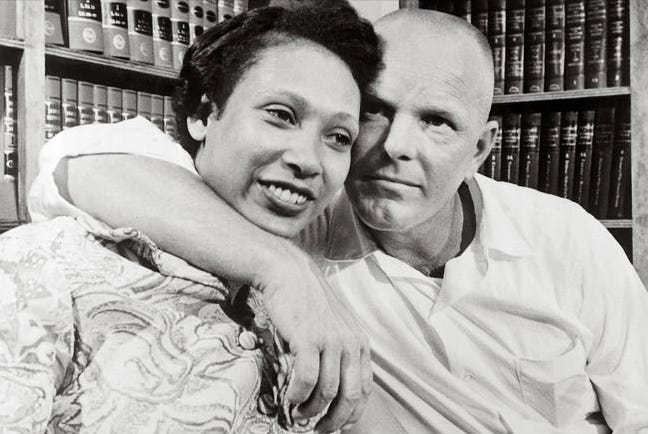The History Behind the film “Loving”
I finally saw the film Loving which tells the story of the interracial couple Richard and Mildred Loving and their fight to live as married in the state of Virginia in the 1960s, a time when interracial marriage was illegal.
First, let me offer a brief movie review. I enjoyed it. I thought it was well filmed and acted. The film was about racism in the American south, but the characters weren’t portrayed as caricatures. The dialogue, particularly between the lead characters played by Ruth Negga and Joel Edgerton, was minimal, but the love in their relationship really came through powerfully in the spaces between the dialogue.
Now let me offer a historical breakdown of the film. The film has been packaged and promoted as a story of black and white. But it’s more like a story of something in between, which exposes the fallacy that our history in America has ever been as straight forward as black and white.
Here’s a quote from the film which to me represents the complexity to which I reference. Let me set the scene. Garnett Brooks, Sheriff of Caroline County, VA, has arrested Richard and his pregnant wife Mildred and has thrown them both in jail. He then immediately releases the white man Richard on bail but leaves his pregnant colored wife Mildred in jail for the weekend. Richard wants his wife out immediately and confronts Sherriff Brooks who invites him into his office and says:
I’m sorry for you. I really am. All ya’ll over there in Central Point [Caroline County, VA] don’t know up from down. All mixed up. Half Cherokee, Rappahannock, part niggra, part white. Blood don’t know what it wants to be. You just got born in the wrong place is all.
The quote offers a glimpse into Virginia’s ugly racial past. Laws forbidding interracial relationships in Virginia date back as early as 1630, where a white man caught with a black woman would receive a whipping and be forced to apologize for his actions. By 1640 the law had morphed to require an apology from the white man and a whipping for the black woman. A 1691 law punished “any white woman marrying a negro or mulatto, bond or free,” by permanently banishing her from the state. These are but a few examples of a series of increasingly oppressive laws called “black codes” introduced in Virginia between 1687–1865, designed specifically to restrict and regulate the behavior of blacks and enforce segregation.
The quote also offers a glimpse into how ineffective these laws had been in preventing intimate interactions between African, European and Native American descended people in Virginia. To be sure, many mixed race families in Virginia trace their origins to the offspring of enslaved women who’d been raped by white men prior to the civil war. But others descended from free ancestors of African, European and Native American descent who’d mixed freely and with consent for generations. Such was the case for at least some of the ancestors of Mildred Loving, who was born in 1939 in Caroline County to Theoliver Jeter and Musiel Byrd.
The presence of communities such as Central Point, and families like Mildred’s throughout Virginia, offered the impetus for the Racial Integrity Act of 1924. The law was designed to enforce the “one drop rule” and to preserve the white race in the state of Virginia and keep it pure by shielding it from racial mixing. It therefore set out to categorize the Virginia population in very simple terms — white or colored -with nothing in between. Persons such as Mildred for example with mixed Native American ancestry would solely be classified as black.
The mastermind behind the Racial Integrity Act of 1924 was a man named Walter Plecker. He was a white supremacist, a consultant to Nazi Germany and a eugenicist. Eugenics was a popular pseudo-science that emerged in the early 20th century based on the belief that the white race could be protected through controlled breeding of affluent whites and forced sterilization of people of color and the poor. Plecker was also the head of the Virginia Bureau of Vital Statistics from 1912–1946 and he used his state power and authority to enforce the Racial Purity Act.
Plecker was particularly obsessed with dealing with Virginians of mixed ancestry like Mildred who in his mind might attempt to pass as Native American. So it motivated him to, among other things, pen this infamous memo to county officials across the state of Virginia in 1943 asserting that Native Americans in Virginia no longer existed. The memo provides a complete list of surnames of which to be aware, by county, of families trying to “pass” for white or Indian. Note the surnames for Caroline County. Among them is Byrd, the maiden name of Mildred’s mother.

In 1964 the Lovings sued the state of Virginia for the right to be married interracially. The case made it all the way to the Supreme Court which ruled in their favor in 1967, invalidating laws in the United States prohibiting interracial marriage, laws that had existed in Virginia since 1630.
Fast forward to today. According to Pew Research Center analysis, there are over 11 million people — that’s 10% of the married population in the United States — with a spouse of a different race or ethnicity (2015). Additionally, the state of Virginia led the nation in the rate of black-white marriage (2010).
June 12, 2017, will mark fifty years since the U.S. Supreme Court ruled in favor of the Lovings and against the state of Virginia, rejecting the legacy of Walter Plecker. As a society, let us continue to move forward.










